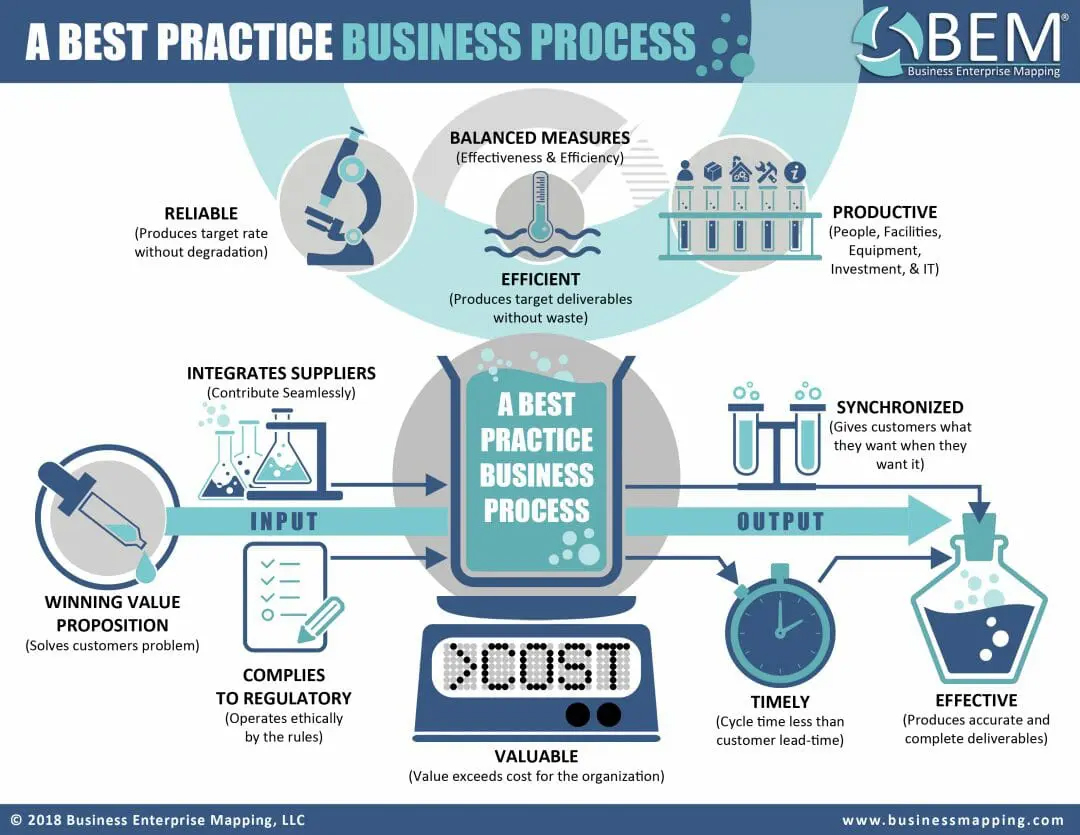We map hundreds of business processes annually covering a wide variety of organization sizes, types, and industries. From this extensive experience, we have learned that all business processes have a set of common performance characteristics that demonstrate their successful execution. Outlined below are ten characteristics that best exemplify a best practice business process.

Best Practice Business Process - Ten Traits
1. Produces a Value Proposition that solves a problem.
The most important element of a best practice business process is that it produces a value proposition that solves customers' problems. This value proposition is expressed through the target specification of the product or service produced by the process.
2. Provides accurate, timely and complete deliverables.
Once the value proposition sets the quality target of a process, the next challenge is that the process produces to that target consistently. Process effectiveness assesses the extent to which the process produces the target value proposition.
3. Complies with third-party requirements.
It is not good enough to know that a process solves its customer problem. The process must also do so ethically, that is, within established regulatory rules and guidelines for that process. A process cannot be considered best practice without performing ethically.
4. Synchronizes supply to demand.
Synchronizing the elements of a process to its demand profile is a key best practice trait that sets the stage for giving a customer what (s)he wants when (s)he wants it and driving out all waste peripheral to that mission. Simplistically, synchronization involves aligning capacity, volume, and variety within a standardized time-bucket for quick customer response.
5. Measures effectiveness and efficiency.
A best practice process measures both effectiveness (the extent to which the process satisfies its customer) and efficiency (the extent to which the process minimizes the resources required to deliver its value proposition).
6. Uses minimum resources.
A business process may utilize many different resources, including people, money, equipment, facilities, materials, and information technology. And there are a variety of ways to measure the use of these resources. The best practice process, however, utilizes fewer of these resources than competitive alternatives. This minimum resource requirement also includes adequate process capacity that optimally matches the demand profile. When evaluating resources, one must assess all resources required, not just resources traditionally seen as valuable (e.g., labor and materials).
7. Demonstrates high reliability & yield.
Best practice process reliability suggests that a process consistently produces to its designed target output without degradation. A process delivering best practice yield produces its product or service the first time without scrap or rework.
8. Delivers fast cycle time.
While response times can vary widely, every customer has a desired lead-time for the product or service being requested from a process. This customer desired lead-time must be compared to the process response time to assess the gap between customer desires and process capability. The best practice process delivers a response time that fits comfortably inside the window of the customer's desired lead-time.
9. Integrates suppliers.
The best practice process incorporates and integrates suppliers into its value stream as a seamless extension of its own purpose. All of the performance characteristics described above equally apply to an integrated supplier in the best practice process.
10. Creates value that greatly exceeds its cost.
While rarely studied in this way, every business process provides value that carries a commensurate cost to produce and deliver its products and services. For the external customer, the value delivered by the process must be greater than the customer’s cost to acquire and use its products and services. For internal customers, the organization’s cost to operate the process must be less than the value provided to internal customers.
The ten best practice business process traits above provide an excellent framework for assessing the practices of any business process, regardless of industry or process type. At the end of the day, a process is a process, and it must deliver performance that delights it's customer and adds greater value for the organization than it costs to operate.

